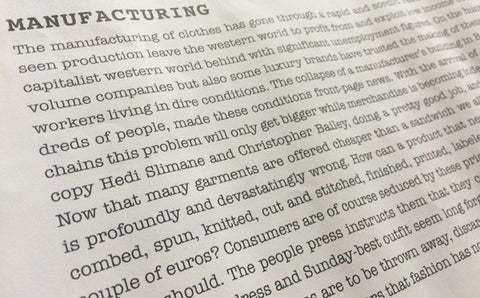What is the meaning of fashion?
The word fashion (derived from the Latin ‘facere’, meaning to do or make) has today come to mean something that is transient, something that will naturally become less desirable over time.
If ‘X is the fashion’, it could mean anything from building styles, cars and travel to food, clothing and even dog breeds.
Yet somehow the word fashion has become most strongly associated, or even interchangeable, with the word ‘clothing’ (and I’m just as guilty as the next person for using it).
A garment of course requires less cash and commitment than the purchase of a building, car or holiday. But as prominent trend forecaster Li Edelkoort recently said ‘Now that many garments are offered cheaper than a sandwich we all know and feel that something is profoundly and devastatingly wrong’.
Li Edelkoort's Anti-fashion Manifesto
What will be our fashion legacy?
‘Fashion is a reflection of the time’, US Vogue editor Anna Wintour commented a few years ago. If so, what will our overwhelmingly fast and continuous consumption of cheap clothing say about us to future generations?
Will they look back and wonder, in an era of unrivalled access to knowledge, communication and skill, why we seemed to place such value on disposability and allow ourselves to be defined by low quality and cheap prices?
And at a time of unprecedented connectivity, why did we knowingly consume goods made in unfair and unethical conditions when there was, increasingly, a choice not to?
When it comes to fashion, can we really call ourselves feminists?
If fashion is looked upon as a reflection of our time, today’s continuing battle for gender equality is in danger of being unrecognised. For when it comes to fashion and equality, we are, most certainly, falling short.
While a 2014 survey revealed that the average British woman will spend over half a million pounds on clothing and accessories in her lifetime, we also know that women between the ages of 18 to 35 make up 80% of the industry working to make these clothes. And their working conditions are far from where they should be.
Conscious Chatter Episode 65 Remake + Connective Human Stories
In a recent podcast, Kestrel Jenkins (founder of Conscious Chatter) and Ayesha Barenblat (founder of Remake World) discussed with interest the differences between sympathy and empathy. And the truth is that we often sympathise with somebody or a situation that we encounter, but rarely do we empathise – because the latter would require us to actually take action.
Wear your values on your sleeve
Elizabeth Currid-Halkett (Author and professor of public policy at the Price School, University of Southern California) recently wrote about a coming shift from ‘conspicuous’ to ‘inconspicuous’ consumption and the growing view that knowledge, education and cultural capital may be becoming increasingly more aspirational than material goods.
In the context of fashion, it may signal a shift to understanding and appreciating the origin of clothing, becoming as valuable as the garment itself.
And in an increasingly connected world, it is easier now, more than ever, to access information, share it with others and take action.
Luciana Zegheanu (contributing writer at Not Just A Label) wrote last month that fashion ‘symbolises the spirit of the times’. Let the generations to come look back on ours as one that, empowered by technology, strived to achieve something better.
The time has come to dress ourselves in ways that communicate not simply who we are and what we like but to a greater extent, what we believe.
Like this post? Tweet it!

For future posts straight to your inbox, sign up to STUDY 34
All of the brands represented on the STUDY 34 platform are driven by individual desires to work towards change – whether that be the sourcing of responsible raw materials, investing in real craftsmanship during the manufacturing process, or seeking to create timeless pieces outside of fast fashion trends.




Hi Eimear,
Thanks so much for your comment – committing and sticking to buying only second hand is really quite impressive! I also love the idea of taking on a challenge – in many cases it adds even more to the story of the clothing. I have a few items I have worn so much that I have had to repair them more than once and always feel a sense of achievement knowing I succeeded in making them last longer (and happiness that one of my old favourites is still around to be worn!). I agree with your comment about ambivalence, spending more on less and cherishing what you have is not only better for the environment but also far more rewarding – Ellie
I too find it rather overwhelming. some years back I started to sew my own wardrobe from (mainly) charity shop buys – then it became to buy from the charity shop reduced rail as this stuff was ‘more of a challenge’, and nearer to landfill….thing is I will still get more than I can sew and so much of it is genuinely good quality (I avoid the f/fashion labels) – I think there is an ambivalence towards waste, and everything has become take out
Leave a comment